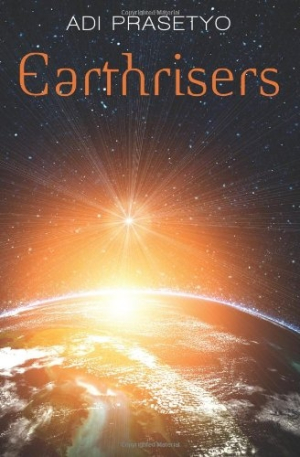Earthrisers
Full of energy, fun, and curiosity, this adventure is a sci-fi joyride.
Star-faring humans return to Earth to find the planet threatened by a mysterious enemy in Adi Prasetyo’s science fiction thriller, Earthrisers. An energetic adventure set in the distant future, the novel has both a modern and old-school feel; the dialogue is reminiscent of contemporary manga and anime while the plot harkens back to golden age space opera. Earthrisers is chock full of powerful alien races, amazing weapons, and mutant creatures roaming Earth.
Generations before the story begins, a colony of humans fled Earth on a ship called Earthrise after an apocalyptic event. The few humans who survived the diaspora came under the protection of Andraeisans, a race of tall, benevolent, elven-like beings. The story begins when Leon Nestreado, the story’s likable, somewhat irreverent hero and direct descendant of the human survivors’ original leader, heads a mission back to Earth to see what has become of it.
Leon and his crew of humans, Andraeisans, and shape-shifting beings called Nixoans find Earth replete with peril. The planet lays ravaged by Asterean, a strange, amorphous enemy whose massive tentacles and thorns emerge from the ground, wreaking havoc and causing animals to mutate into horned, rampaging beasts. Leon’s team finds other humans, those who remained on Earth, living in the terrible wasteland. To them, Leon’s crew are instruments of a prophesied liberation. Much of the book revolves around Leon’s team hunting for a way to destroy the malevolent, hive-minded Asterean and fighting in numerous skirmishes against ferocious mutant versions of African animals.
The story seems to have been drawn most notably from the broad, heroic space exploration days of early science fiction. There’s none of the pensive, inward-directed moral quandaries common to post-Cold War sci-fi. Earthrisers has more in common with Buck Rogers than with contemporary speculative fiction stories. Prasetyo creates villains and heroes who speak with zeal and without irony. For example, when a character becomes possessed by the Asterean, he says, “Humans are weak and pathetic!” and “Die like your stupid ancestors long before you!”
The storytelling is not without stumbles. A frequent lack of specificity in descriptions (such as “his sharp, enigmatic eyes”) fails to provide distinct imagery. Especially in the beginning of the book, there are regular allusions to events that happened out-of-story, as if they are common knowledge, leaving it ambiguous as to whether this is a sequel or a stand-alone volume.
It is the go-go-go pace and the occasionally puzzling, but always earnest, velocity of the story line that comprise Earthrisers’ strongest traits. Imagining heroes zooming around on flying vehicles fighting against horned and clawed elephant-creatures gone berserk is pure enjoyment. And it’s clear that Prasetyo himself had fun writing the action sequences. A reader looking to go on a science fiction joyride through a planet full of monsters will share that enthusiasm.
Reviewed by
Jason Henninger
Disclosure: This article is not an endorsement, but a review. The publisher of this book provided free copies of the book and paid a small fee to have their book reviewed by a professional reviewer. Foreword Reviews and Clarion Reviews make no guarantee that the publisher will receive a positive review. Foreword Magazine, Inc. is disclosing this in accordance with the Federal Trade Commission’s 16 CFR, Part 255.

